How Do You Like It Now, Gentlemen?
The above is a link to the Lillian Ross interview with Hemingway, a sad betrayal of his kindness and friendship to a young writer.
There’s a famous profile of Hemingway that was published on May 13, 1950 in The New Yorker done by a very young journalist at the time named Lillian Ross. Hemingway had helped her with her first big article about Sidney Franklin, the first Jewish-American bull fighter. Hemingway and Lillian Ross became friends and as Hemingway often did, he enjoyed taking this younger, very smart woman under his wing and addressing her as “daughter” and sharing some of the things that he knew with her.
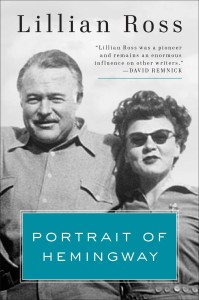
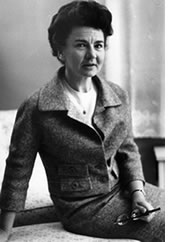
Lillian Ross started working at The New Yorker in 1945 and seemed particularly adept at charming her subjects into saying things they might otherwise not say. She asked to do a profile on Hemingway, who needed the publicity like a hole in the head, but he agreed, hoping to help her career. She shadowed him for months and in particular went with him to New York on a three-day tour. Hemingway viewed it all as a lark.
Here’s where my objectivity stops. As I noted in my opening post three years ago, while I try to be objective about Hemingway and his flaws, which were many, I’m on his side. I’m not neutral. Lillian Ross’ article made him look like a self-involved jerk, almost ignorant. He thought she was his friend.
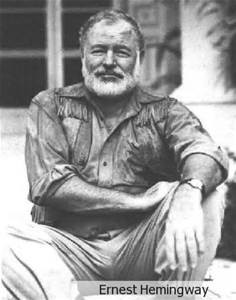
In that article are statements by Hemingway such as “Book is like engine. We have to slack her off gradually.” And then there’s this repeated gem apropos of nothing, “How do you like it now, Gentlemen.” Ross always maintained that it was an affectionate portrait of a wonderful writer, but, in essence, it made fun of him and it made him look ludicrous. If that’s how she saw him, then so be it. The press is free and she can write what she’d like to write, but don’t pretend it was an “affectionate” portrayal.
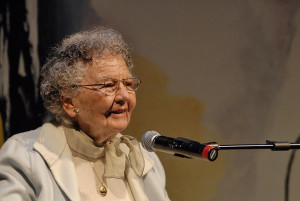
At the time, Lillian Ross was 24 years old and it was the opportunity of a lifetime to profile Ernest Hemingway, the biggest writer of the day. Years later, The New York Times wrote that “The effect of her severely unadorned portrait was to create an impression of an unpleasant egotist, a celebrity who, to a pathetic extent, had identified himself with his own public image.” As one of Hemingway’s biographers, Jeffrey Meyers, wrote later that she’d repaid his generosity with meanness and malice, and established her reputation at his expense.” Quoting Meyers again, he notes that she never recorded or revealed the serious and sensitive side of his character and chose instead to portray him as a boring braggart. So how do you like it now, Gentlemen?
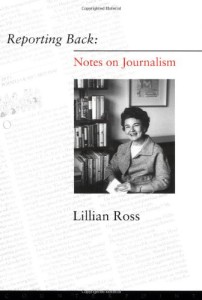
When Lillian published the profile in book form shortly after Hemingway’s death, she still claimed it was a sympathetic portrait of a great, loveable man. Few readers were fooled. She also claimed he was fine with it. True. He read it before publication; felt the dye was cast so said little; and passed on it, but it was not really “fine” with him. He was hurt.
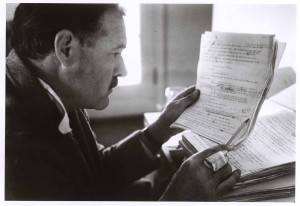
If you look at the cover, could Lillian have picked a less attractive, less compelling photo? In a reissue, there’s a nice photo of Hemingway and Lillian on the front, but I believe the original shows a Hemingway looking out of it and bizarre. If I’m wrong on this, someone out there probably knows, so please correct me.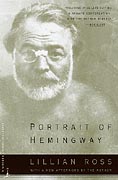
Lillian Ross has written a new book in which Ross has collected selected pieces, including the Hemingway profile along with newer works spanning her sixty year career as a journalist. It is called “Reporting Always: Writings From The New Yorker.” It was published last week by Scribner’s, which, of course, is Hemingway’s publisher.
I can’t help being wounded for him. He trusted her and thought they were having some fun together and that she would not portray him as a lout. It’s his fault in part, no question for being too casual and not foreseeing damage for not taking the interview seriously. However, his loyalty was betrayed.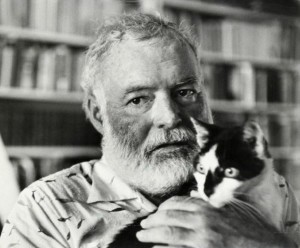
Take a read and see what you think. Perhaps you’ll see it differently. I’m happy to stand corrected or confronted.
Love,
Christine


As much as I adore Hem, I observe he could usually dish it out more than he could take it. For some reason, he took the Ross portrayal. Others who dissed him were dismissed by him, usually forever.
Very true. He tossed away a lot of friends due to that personality trait. He had his insecurities and seemed to lash out badly. And you’re right. I don’t know why he didn’t lash out at Lillian Ross but he didn’t.
Hi Denise! Not sure why i didn’t comment on your comment earlier. I agree completely with your observation. He was thin-skinned about others comments. He could make fun of himself and was ok with that but not so keen on others negative assessments. Thank you for commenting way back then! Best, Christine
If we want to be honest about it most of us are thin-skinned even though we may not say anything hurts us for someone to critique especially someone who we love and Trust watch Hemingway be any difference? He was brilliant. He was genius. And he was very flawed as most of us are if we look very honestly on ourselves God Rest his soul
100% agree, Jim. Thanks for your comment. I enjoyed reading it very much. And we are all pretty thin-skinned when it is something we’ve poured our life’s blood into and what we consider our reason for being. I think that is how Hemingway felt about his writing. When he couldn’t do it anymore, well . . . you know the rest. Yes, may he rest in peace. Best, Christine.
Hi, I ended up here after reading an essay on Lillian Ross by Andrew O’Hagan in the London Review of Books. FWIW, Hemingway wrote in in 1951 that “Lillian Ross wrote a profile of me which I read in proof, with some horror. But, since she was a friend of mine and I knew she was not writing in malice, she had a right to make me seem that way if she wished.” O’Hagan’s take on it was that Hemingway “knew it was a take-down but he couldn’t fault the prose.”
Hi Mithran: I know that Hemingway did know it was a take down but he didn’t change the article even though she sent it to him in advance, He also still counted Lillian as a friend. I was offended on his behalf though and Several Hemingway biographers noted that she repaid his kindness with a stab in the back. Thank you so much, Mithran, for reading the blog and enjoying Hemingway. Best regards, Christine
PERSONAL NOTE: I met Hemingway while going to France aboard a ship on which he was a passenger. It was 1953 and I was 10 years old. I was amazingly fortunate to spend a fair amount of time with him and, as the highlight, he helped me fire one of his shotguns–at a clay pigeon–from the penthouse deck he and Mary enjoyed.
PROFESSIONAL QUESTION: I went on to become a newspaper and magazine journalist. As I read Lillian Ross’ piece for the first time the other day, I had a recurring thought: “How was she able to provide so many detailed quotes? First, because of what he said and. perhaps even more mysterious, because of the highly unusual way he structured his sentences.
There are, I concluded, several possibilities: (1) She took copious notes; (2) She used a tape recorder; (3) She had a phenomenal memory, (4) She took great liberties in reconstructing his comments or (5) A combination some or all of the options.
I ruled out (1) because the conversations she cited were often long and detailed, not to mention that she could not possibly have been taking (detailed) notes under the circumstances she described–although she could have written down her recollections after each encounter. Further, it would certainly have been awkward since, unlike a one-time sit-down or phone interview, the interviewee would expect to be quoted accurately.
I ruled out (2) because, at best, in 1950 large, heavy reel-to-reel tape recorders were her only option. Obviously, that would have been totally impractical, especially when they were out of the hotel suite.
I finally decided that a blend of (3) and (4) constituted the basis for her generous use of quotes.
Does anyone know if she ever was asked about that and, if so, her answer made public?
HI David! Very interesting thoughts. I know that Aaron Hotchner said she always had a little pad and would sit writing everything down as she followed Hemingway around. So i think a blend of 1,3, and 4 are likely it. However on your first note! WOW! What a chance to meet him. He was so varied. He could be a bully and thin-skinned but he also could be very gentle, kind, and considerate and I think liked kids. He usually cut off and not nicely those who hurt him but he didn’t seem to do that with Lillian. Again, not what I would have expected. Thank you so much for sharing that story as well as your observations about the Lillian Ross article. I wonder if she ever regretted that article. She never said so and she has stood by her claim that it was an “affectionate” portrayal. Hmm. Most disagree. Best to you, David, and thank you for reading this blog and caring about Hemingway. Christine
I don’t know, Christine. I don’t think Lillian Ross really made out at Hemingway’s expense so much as you think. She was 32 when she published the piece, not 24; she’d been at the New Yorker for seven years. More importantly, I didn’t feel the piece was a takedown as much as you did. I quite liked the Papa that Ross wrote about. He was funny and he was sweet — much funnier than most of his books. He was repetitive, yes, but so am I, and so am I. Sure, he drank too much, but you knew that already. He was a world-famous author who didn’t enjoy having to buy a coat, but he loved his friends — Mary, and Dietrich, and Winston Guest — and Lillian Ross, too. I do think it was an affectionate portrait; it just wasn’t Hemingwayesque.
I am interested to hear your take on it, Ken. I always viewed it as opportunistic and mean-spirited. I felt he deserved gentler treatment from her after a real helping hand. But i am actually pleased to hear that you did not view it that way and saw it as affectionate. I’ll reread with your comments in mind. Thank you so much for commenting. I really appreciate it. Best, Christine
Small Correction:
I believe Lillian Ross was 32 years old at the time of the Hemingway profile. More than old enough to know better.
Good entry though. Thank you.
Thanks, Bill! I am always grateful for corrections. I know a lot about hemingway and his life but I am a rank amateur compared to many and i learn from others. very best and I appreciate your reading this blog. Best, Christine